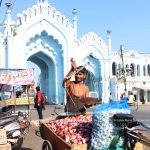No pride but Mujhe chalte jaana hai…
Saira Mujtaba takes a ride in the fast disappearing tanga of Lucknow
He is no sherwani clad Lucknawi poet or writer, dragging on a hukkah, ensconced in an armchair and nostalgic about the old times. He is just one of the few remaining ‘tangawalahs’ in town who is no longer proud to be a tangawala.
Gone are the days when he, like his forefathers, was treated with respect for being in service to the Royal Nawabs. Today, he is a living testimony to the winds of change that blow over Lucknow. Having seen both the rise and fall and the highs and lows of life, he watches helplessly the once glorious tehzeeb of Lucknow turn gory.
Welcome to the world of an insignificant ‘tangawala’ who has close contact with both the khaas-o-aam and who, oh yes, also has a name!
Jugnu is 55 years old but looks much older than his age. He is short of height, his complexion is tanned and his pale yellow teeth hang precariously to his gums. But Jugnu’s firefly-like eyes are bright and his energetic voice betrays notions of premature ageing.
Jugnu was born and brought up in Lucknow like his ancestors. His chest puffs with pride as he claims that Lucknow runs in his blood.
“I have been riding a tanga since 1978 and before me, my father and grandfather did the same,” he smiles.
The stretch from Pakka Pul or Hardinge Bridge, past the Imambaras and all the way to the Jama Masjid, would not be the same without a tanga plying on the road. It is assumed that because Jugnu is proud of his legacy, he would like to pass it on to his children but this is far from reality. He does not want his son to follow in his footsteps because there is no izzat in this profession now and not only because the earning is paltry. He barely earns Rs 10000 a month that goes into taking care of Kabootri, his spotless white mare.
He has a wife, four daughters and a son also to feed. “Kabootri is dearer to me than my own son. If I ask something of my son I am not sure if he will listen to me but for the past decade, I can’t recall a single instance when Kabootri has refused my instructions,” says Jugnu who shares a deeply emotional bond with Kabootri which is obvious.
Kabootri’s taut muscles relax at Jugnu’s touch and her ears twitch in attention when Jugnu speaks to her in their own language of love that sounds merely as ‘Kluk Kluk’ to others.
This Women’s Day, Jugnu salutes the presence of Kabootri in his life who supports and helps to keep alive his entire family.
Much credit goes to Munnan Khan, a breeder and owner of Super Star Bagghi, a rental company who gifts horses to tangawalahs like Jugnu to take care and earn. The deal is that Jugnu and others like him will bring the animals back to pull carriages at a wedding ceremony when the need arises.
It is time to show some consideration towards the tanga. Jeo Nawab, formerly in charge of the Bada Imambara is concerned about the plight of both the tradition of the tanga and tangawala and their bleak future.
“The tangawala should be treated as contractual/permanent employee by the Tourism Department of the State Government with a fixed salary, thus, enabling them to live a dignified life and restore their honour,” is the suggestion of the Nawab.
But the battle of Jugnu and Kabootri is not just theirs but of everyone passionate about the rich culture of Lucknow.
It is time for all of us to join hands with Jugnu to help him and Kabootri survive for eons to come.
Kya kehti hai Kabootri…

I am Kabootri, a nine-year old mare. I don’t know who christened me but I do love my name not because I am as white as a pigeon but because I feel as if I’m flying when I trot from the Bara Imambara, through the Rumi Darwaza all the way up to Chota Imambara and Jama Masjid; my forehead and mane caressed by a cool breeze.
I am unable to find a soul mate amongst my own, because I am taken only occasionally to the farmhouse, just for mating. But being feminine with an emotional heart, I have found my better half in Jugnu. He is my father, lover and above all a friend. I infer that he hasn’t had a formal schooling but his chaste Urdu belies that. His ancestors served the Nawabs for generations. Jugnu is an encyclopedia of everything related to horses and carriers. He can tell you the difference between a tanga, tam-tam, ikka, tangia, bagghi and khadkhada and is able to sense my feelings without my expressing them.
We are fellow travellers in this journey called life and together eke out a living in a world where rules are made by human beings and where everything comes with a price tag. I often wonder why people think of me as a nuisance on the roads because unlike them, neither do I honk unnecessarily nor am I in a rush to overtake others, but on the contrary, I trot and canter at my chosen pace of life; watching the crazy bikes and cars rush past me. Come and have a ride to enjoy the rhythmic music created when I tap my hooves against the road. Come and look at Lucknow from a vantage point, sitting comfortably on Jugnu’s tanga!
No matter how meagre his monthly earnings are, Jugnu’s first thought is to feed me. Although he is unable to buy me dry fruits but the ghaas, choker, chana or grass, husk, grams he feeds me with such love, that coming from him everything tastes like a feast.
Every morning after feeding me, he combs me with a kharaira (curry comb) and I’m amazed how like a brush of feathers that otherwise hard metal contraption with sharp teeth, feels n his hand. Jugnu harnesses me with equal love and care so that together we can kick off yet another day full of hope.




